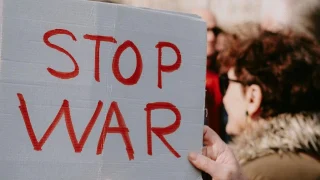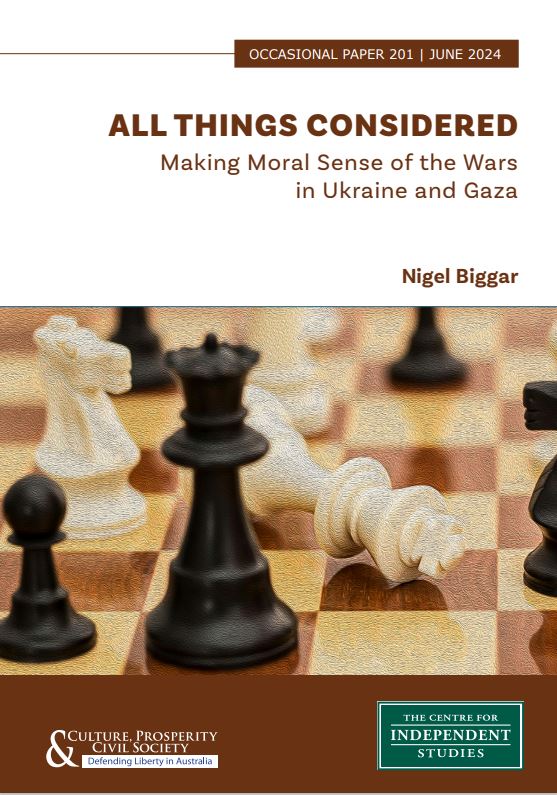

Foreword
I am for peace, but whenever I speak of it, they are for war.
— Psalm 120:7
War is bloody and destructive. At times, like the psalmist, we may wish to avoid war only to have it forced upon us. But at other times, circumstances might compel us to wage war against a foe. And because war raises a tangle of complex moral and legal issues, the practice of war — in whatever circumstances it is waged — is always controversial.
At the time of writing (June 2024), two wars command daily attention above all others: the war in Ukraine against Russia’s invasion in February 2022; and the war in Gaza waged by Israel against Hamas in response to Hamas’s invasion of Israel in October 2023. Opinion about both conflicts remains sharply divided in many Western countries, including Australia.
Arguments concerning the justification for going to war frequently betray confusion about the distinction between the legality and the morality of war. We may think that because a war is declared ‘legal’ — say, because it is sanctioned by the United Nations Security Council — it must therefore be morally justified. But sometimes war may be morally justified notwithstanding the withholding of legal sanction. A fundamental point to remember in any consideration of whether or not war is warranted is that law and morality do not always coincide.
Making moral sense of war requires more than an estimation of legality. Other factors must also be taken into account, including the objectives of the war, the intention with which it is pursued and — more controversially — the question of proportionality. There is general, though not universal, agreement that Ukraine is morally (and legally) justified in defending itself from Russian attack. However, the same agreement is not seen regarding the war in Gaza. Indeed, the war, which was started by Hamas and would end if Hamas were to surrender, has provoked world-wide protests against the actions taken by Israel.
In this important new essay, Professor Nigel Biggar evaluates the concept of the ‘just war’ and demonstrates how it offers a valuable framework to discipline and focus arguments about whether a particular conflict is justified.
Disagreement about the justification for war will not dissolve, but Biggar shows how critical application of ‘just war’ criteria can at least serve to provide a framework within which to argue about the ethics of war.
— Peter Kurti, Director — Culture, Prosperity & Civil Society program
1. Introduction
The pacifist answer to the problem of war is straightforward. Any use of violent force by anybody in any circumstances is immoral and should cease. War is always worse than its alternatives; peace is always preferable. This is not a view to which I subscribe. We all want peace, but at what cost and to whom? If those who believe in the possibility of morally justified war have to reckon with the dreadful consequences of their position, so do pacifists. Not going to war in 1994 was good for Britons and Australians, but not so good for the Tutsi in Rwanda: our staying at peace left the Hutu at peace to slaughter 800,000 of them. Peace, like war, is morally complicated.
The war in Ukraine has resulted in the widespread devastation of the country. Russian president Vladimir Putin’s threat to use nuclear weapons hangs over it, and it seems unlikely that the Ukrainians can triumph over Russia. So, surely it would have been better, if Kyiv had not resisted in the first place. And would it not be best, if it were to stop resisting now?
Meanwhile in Gaza the civilian casualties of the war between Israel and Hamas continue to mount. South Africa has accused Israel of genocide, and the chief prosecutor of the International Criminal Court has applied for a warrant to arrest the Israeli Prime Minister. And yet, it was Hamas that began the current phase of the conflict with the horrendously deliberate and indiscriminate massacre of Israeli civilians on October 7 last year. And it is Hamas that planned to make a battlefield out of a dense urban environment, building tunnels for its gunmen but no shelters for non-combatants. And it is Hamas that is constitutionally committed to eradicating Israel. So how are we to make coherent moral sense of the situation?
2. ‘Just war’ thinking
Thinking about the moral justification of war goes back a long way in Western civilisation, certainly as far as the ancient Romans, if not before them to the ancient Greeks. But it was the early 5th century AD North African Christian bishop, Augustine, who first began to outline the elements of what would become the ‘just war’ tradition of thought about the ethics of war. Responding to a pastoral query from a Christian military tribune about how to reconcile the Christian Gospel of love with the political need for the use of violent force to keep the peace, Augustine made a crucial distinction: what is wrong is not the use of force itself, but its motive and intention.[1] Provided that it is not motivated by vengeance and intends to create the conditions for a just peace, war may — tragically — be justified.
Over the subsequent centuries, through the thinking of such people as Thomas Aquinas in the 13th century, Francisco de Vitoria in the 16th, Hugh Grotius in the 17th, and Paul Ramsey in the 20th, the Christian ‘just war’ tradition grew into the most sophisticated ethic of war available. And stemming from Michael Walzer’s famous book, Just and Unjust Wars, in the 1970s, a non-Christian, moral philosophical version of the Christian tradition has since developed, too.[2]
In the course of its history, the ‘just war’ tradition has developed two sets of criteria. One governs the decision whether or not to go to war in the first place (ius ad bellum: ‘justice toward war’); the other, the conduct of war that has already been embarked upon (ius in bello: ‘justice in war’).
3. ‘Just war’ criteria before the event
There are five accepted ‘just war’ criteria prior to the event. The first and most basic criterion for going to war is a ‘just cause’. According to the long-standing Christian tradition, this comprises an injustice that requires correcting. Here, then, ‘just war’ has the basic form of the rescue of the innocent. The so-called doctrine of the ‘Responsibility to Protect’, which was articulated in the wake of atrocities in the Balkans during the 1990s and promoted by the Canadian government in the early 2000s, expresses this point of view. However, exponents of secular philosophical versions of ‘just war’ thinking, such as David Rodin, tend to assume a different position.[3]
Following post-1945 international law, this group specifies ‘just cause’ as an attack on a sovereign state that requires fending off. So, in their eyes, ‘just cause’ takes the form of national self-defence. I prefer the Christian version, not for dogmatic reasons, but because, arguably, the letter of international law would forbid military intervention to stop genocide within the borders of a sovereign state, if the United Nations Security Council (UNSC) could not agree to authorise it.
Since war, however strongly justified, is invariably highly destructive and hazardous, it is not enough merely that there be some injustice that needs correcting. The injustice must be ‘grave’ enough to warrant the war’s costs and hazards. The implication is that many forms of injustice are better either borne or resisted pacifically, than by resort to force of arms.
‘Just cause’ in the form of a grave injustice is necessary, but not sufficient, to justify going to war. The reason is this. Suppose that you are suffering an unwarranted assault and I intervene against your aggressor. I do so, however, not because I want to protect you, but because I want to get my hands on the oil field under your feet. Therefore, in order for belligerence on behalf of the innocent to be justified, the belligerent must meet a second criterion by having the ‘right intention’; the belligerent must intend rescue, first and foremost, and not something else.
Because war is both costly and hazardous, if there are alternative — diplomatic or economic — ways of correcting a grave injustice, those should be preferred. Therefore, to be justified, the third criterion to be met is that the war must be an action of ‘last resort’. This does not mean that every imaginable alternative must be sought — that, for example, negotiations with an aggressor who displays serial bad faith must be prolonged until a formal breakdown. Rather, it means that all reasonably feasible alternatives should be tried.
The fourth criterion is ‘proportionality’. This is a controversial concept that can mean several different things. Some argue that, for a decision to go to war to be ‘proportionate’, we must be sure that the benefits will exceed the costs. The problem with this, however, is that such a calculation is usually impossible. The future is often so unpredictable that we cannot predict the effects of what we do with much certainty. That is all the truer in the matter of war, which, once begun, invariably acquires a momentum of its own that is difficult to control. In practice, often all we can do is to be prudent: judge whether a certain injustice is sufficiently grave as to be intolerable, imagine the worst-case scenario in war and look it honestly in the face, and guesstimate whether we will be able to withstand it, should things go pear-shaped.
An alternative conception of ‘proportionality’ is that no more innocent non-combatants should be inadvertently killed in the course of waging a ‘just war’ than that war is seeking to rescue. The problem with this arithmetical concept is that the aim of a ‘just war’ is seldom merely to save a certain number of lives, but to create new political conditions where the relevant grave injustice will cease and not easily recur to oppress future generations. It is not just about quantity, but also quality. Nor is it just about present individuals, but also future ones. Most people in the English-speaking world think that the war against the massively murderous, European-wide tyranny of Nazi Germany during 1939-45 was morally justified. And yet, its success cost the lives of tens of millions of individual Europeans.
The most sensible concept of proportionality, I think, is one that asks whether war is a necessary or the most apt means to achieve the goal of overcoming a grave injustice. Do belligerent means fit the end of a just peace. If so, war is proportionate.
The fifth and final criterion here is ‘legitimate authority’. When this was first formulated by Thomas Aquinas in the 13th century, it took for granted the political environment in Italy at the time: an anarchy of private enterprise mercenary bodies, city states, and overarching and rival papal and Holy Roman imperial authorities. The point of the criterion, therefore, was to assert, at least, that war should only be waged by bodies with responsibility for the public good, and not by those in pursuit of merely private interests.
4. ‘Just war’ criteria during the event
Whereas there are five criteria of going to war, there are only two of war-fighting. The first of these is ‘discrimination’ or, as it is sometimes referred to, ‘distinction’. This holds that morally justified belligerency must discriminate between combatants and non-combatants, and that it should never intend to harm the latter. The rationale for this is that the proximate aim of warfighting should be to so overwhelm the enemy that he gives up and lays down his arms. This cannot be achieved by harming those who do not bear arms in the first place. Intentional attacks on non-combatants, therefore, can have no military justification.
However, the principle of ‘discrimination’ recognises that, in practice, it is often impossible to prosecute a war without risking the lives and limbs of non-combatants. Therefore, what it requires is that a just warrior never intends to harm them, in the sense of not aiming to do so. His aim should always be to hit a military objective. That said, the just warrior may deliberately embark upon a course of action that will risk harm to non-combatants, provided that the objective is sufficiently important, the risk is unavoidable, and every reasonable measure is taken to minimise it. Given those conditions, resultant non-combatant casualties are considered to be ‘collateral damage’ — that is, literally, damage that is beside the point. This manner of thinking about human action is called the theory of ‘double effect’: a single, deliberate action can have two effects or consequences, a good or permissible one that is intended, and a bad or impermissible one that is unintended but, tragically, unavoidable in the circumstances.
The second criterion of the just waging of war is, again, ‘proportionality’. The military means used should be apt to the military objective, causing only such damage — to combatants, non-combatants, and civilian infrastructure — as is necessary. They should also avoid being counter-productive in terms of the larger, political end of all military means — for example, alienating the hearts and minds of the civilian population and so making the achievement of a just, stable peace more difficult.
These two criteria of here are the only two elements of the ‘just war’ tradition that have been incorporated into the Laws of War, otherwise (and confusingly) known as ‘International Humanitarian Law’.[4]
5. Justified, not pure
Before I complete this exposition of ‘just war’ thinking, I should make two further remarks. First, while the ‘just war’ criteria do give us the analytical tools to think and discuss the rights and wrongs of a particular war, their application involves interpretation and judgement — and the interpretation and judgement of different people will differ. They will not guarantee the production of the universally acknowledged right answer; they will only give us the terms with which to discuss what that answer might be. Wars are invariably and permanently controversial. Historians continue to argue over whether Britain and its Empire should have entered the First World War on the side of France in 1914. And at least one historian still doubts that Britain should have entered the Second World War in 1939.[5]
Second, a just war does not pretend to be a morally perfect war. It only claims to be morally justified all things considered. No war is fought by saints; every war is fought by sinful, flawed human beings, who have vices as well as virtues. Even a just war, therefore, will contain elements of injustice. The war against Hitler, for example, involved the carpet bombing of German cities, which was, arguably, unjustly indiscriminate.
6. ‘Just War’ and international law
The only parts of the ‘just war’ tradition that have been incorporated into International Humanitarian Law’) are the two criteria during the event — discrimination and proportionality in the waging of war. As we shall see below in the case of Israel’s belligerency against Hamas in Gaza (see section 10), some international lawyers would now intrude International Human Rights Law into the legality of warfare. This would have the effect of tightening the constraints upon what law-abiding troops in the field may do, which would be good for vulnerable civilians. At the same time, however, it would make it much more difficult for law-abiding, Western troops to wage war effectively against ruthless enemies that spurn the law and respect for rights altogether.
On the matter of going to war, Christian ‘just war’ ethics and post-1945 international law do not concur. According to the law, the paradigm of a legal war is one fought in self-defence and sovereign states are permitted to defend themselves against aggression unilaterally. In contrast, according to ‘just war’ ethics, the paradigm of an ethically just war is one fought to rescue the innocent from a grave injustice — regardless of whether the innocent belong to one’s own people or those of another. Yet, according to the letter of the law, military intervention for humanitarian purposes in a sovereign state is forbidden, unless authorised by the United Nations Security Council.
This tension came to a head in 1999 when Serb troops began the ‘ethnic cleansing’ of Albanian Muslims in Kosovo, creating a flood of refugees, and threatening the stability of Macedonia. Five years earlier, Bosnian Serb troops had been responsible for the massacre of more than 8000 Muslim men and boys at Srebrenica. According to the letter of international law, while sovereign states may unilaterally defend themselves against aggression, the authorisation of military action is otherwise reserved to the UNSC.
In this case, because of its historical and cultural affiliation with Serbia, Russia — one of the permanent five members of the council — would have vetoed military intervention for humanitarian purposes by NATO. Therefore, NATO proceeded without authorisation, breaking the letter of international law. Nevertheless, according to the eminent Finnish professor of international law, Martii Koskenniemi, “most lawyers … have taken the ambivalent position that [NATO’s military intervention in Kosovo] was both formally illegal and morally necessary”.[6]
In the wake of 1999 an attempt was made, in effect, to marry ethics and the law, by persuading the United Nations to affirm an international norm of military intervention to prevent mass atrocity or genocide within the borders of a sovereign state. A proposal was formulated by the Canadian government’s International Commission on Intervention and State Sovereignty (ICISS) in its 2001 report, The Responsibility to Protect.[7] Unfortunately, debate was overshadowed by the highly controversial invasion of Iraq in 2003, which stiffened opposition to any loosening of the reins on unilateral action.
As a consequence, the report of the Secretary General’s High Level Panel on United Nations Reform in 2004, the Secretary General’s own report of September 2005, and the Outcome Document of the 2005 UN World Summit all reaffirmed the prohibition on the use of force without prior Security Council authorisation, except in the case of armed attack;[8] and the Panel expressly rejected the claim that force can sometimes be legitimate, even if unlawful.[9]
The tension between ethics and the law, therefore, remains. As things now stand, should a state conduct a genocide within its borders, and should the UNSC be unable to agree upon authorisation, military intervention to stop it would be illegal.
In 2024, therefore, how does a ‘just war’ analysis help us to make moral sense of the wars in Ukraine and Gaza?
7. Russia’s war on Ukraine
Russia’s invasion of Ukraine in February 2020 was without doubt legally unjustified, since Russia was a signatory to the Budapest Memorandum of 1994, which bound her to recognise Kyiv’s sovereignty and guarantee Ukraine’s borders. What is more, the invasion was morally unjustified, too. However corrupt Ukraine’s government was, it was not — as President Putin claimed — Nazi. And while Kyiv had been oppressing Russian-speaking citizens by promoting the Ukrainian language, that hardly amounts to genocide, according to any sensible definition of the term. There was no grave injustice that required Russian correction.
Besides, there is evidence that Putin was less motivated by concern at the plight of Russian-speaking Ukrainians than by ethno-nationalist dogma that Ukraine is a natural, essential part of Russia.[10] But the existence and borders of nations are contingent things. They come and they go, like all human creatures. No nation’s existence and composition are underwritten by Nature or Heaven. Whether or not Ukraine should belong to Russia depends, not on romantic notions of historical destiny or of the essence of Russianness, but on whether the legitimate interests of the Ukrainian people would be better served by so belonging. And even if that were so, Ukrainians needed persuading of it; overrunning their country with tanks and bombarding their cities is hardly an effective way of wooing them. Putin’s military means have been largely counter-productive insofar as they have confirmed in their Ukrainian identity many Russian-speakers who were once sympathetic to Moscow.
The failure of Putin’s invasion of Ukraine to meet the just cause and right intention criteria is sufficient to damn it as unjust. There is no need to proceed to apply the remaining criteria —last resort, proportionality, and legitimate authority. If there was no grave injustice to warrant war in the first place, and if the intention was not to correct it, it does not matter whether the invasion was a last resort, apt to achieve an unjust end, or authorised legitimately.
What, then, about the justice of Ukraine’s military resistance? Putin’s invasion is an injustice and, given the ruthlessly lawless nature of the regime in the Kremlin and the grossly indiscriminate manner of the war it is waging, that injustice is grave. This gives us the first, fundamental mark of a just war, according to ‘just war’ thinking: a grave injustice that needs rectifying.
The second mark or requirement is that the intention of those who would take up arms to oppose it is, indeed, to rectify the injustice — rather than, say, using the injustice as a pretext for doing something else. There is surely little doubt that armed resistance by Ukraine intends to stop and reverse the grave injustice being perpetrated by Putin.
Ukrainian belligerency also meets the other three other ‘just war’ requirements for going to war. Under international law, the Kyiv government has a unilateral right to offer self-defence, that is, it has legitimate authority. Its going to war was a last resort, given that diplomatic efforts to dissuade Putin from invading had manifestly failed. And its belligerency is a proportionate (apt) means of securing the end of a just peace.
But what about Western support for Ukraine? If Ukraine’s cause is just, then so is coming to her aid militarily, if that is what Kyiv wants. The question then arises: what kind of military aid should Western countries give? Since Russia does have nuclear weapons, and Putin might be reckless enough to use them, it would be prudent to avoid direct conflict with Russian forces — and prudence is a virtue. For that reason, it is right that the United States and its allies have not imposed a No-Fly Zone, since that would probably involve NATO nations shooting down Russian plans and attacking military sites on Russian territory. Continuing to supply Ukrainian forces with equipment is indirectly confrontational and less provocative, and so a more prudent risk to take. Risk cannot be avoided; life is not a safe place. Whereas we should avoid taking reckless risks, the greater the threat, the greater the risks worth taking.
However, the costs of over two years of war to the Ukrainian people have been immense and it is now looking unlikely that they will be able to expel the Russians from Crimea – annexed in 2014 – and the Russian-supported separatists from Donbas, unless Western help were to increase dramatically in kind and scale. Besides, many supporters of the Kyiv government have now left the Donbas. The time might be approaching, therefore, when further Ukrainian belligerency becomes disproportionate, inapt to secure a more just peace. In that case, Kyiv should come to terms with Moscow, at least in the form of a truce — if a full-blown peace-treaty is unacceptable to deeply aggrieved Ukrainian popular opinion.
Such an outcome would not be ideal, of course, since it would allow Putin to consolidate his grip on the Crimea and Donbas and reward his aggression. And it would prevent many Ukrainian refugees from returning to their homes and restoring the status quo ante. On the other hand, Putin’s aggression has cost Russia dearly in terms of the lives of its citizens and its economy. It has also revived NATO and, by provoking Finland into joining, expanded it — which is part of what Putin wanted to prevent. Moreover, he has been denied his goal of seizing control of the rest of Ukraine. So, arguably, a truce would see Russia sufficiently punished for its unwarranted aggression as to be deterred from trying it again.
8. The Israel-Hamas conflict and the narrative of decolonisation
The ‘decolonisation’ story is a moral melodrama. It plays out in terms of sharp divisions, stark colours, and simple conflicts: black versus white, the oppressed versus the oppressor, good versus evil. That is the comic-book source of its recruiting appeal, which excites the natural desire of mortal human beings to plug their lives into a grander, transcendent narrative that lets them imagine themselves as righteous crusaders casting down unrighteous infidels.
It is also the spiritual source of decolonisers’ lack of moral scruple. For, if your opponent is simply wicked, why restrain yourself? What does utter evil deserve except utter destruction? Accordingly, the day after Hamas’s atrocious attack on Israel on 7 October 2023, Dr Shahd Hammouri, lecturer in international law at the University of Kent, posted on Instagram her view that “resistance by the Palestinian people by all means available … is a legitimate act”. Two months later, on Al Jazeera’s website, she explained herself in terms of Israel’s ‘settler colonialism’: “Everything that is happening now in Israel-Palestine is taking place within the context of colonisation, occupation and apartheid … Israel is a colonising power and the Palestinians are the colonised indigenous population”.
That is the simplistic and misleading melodrama. Here is the complicated truth. Israelites had been present in areas of what is known as Palestine from the 11th century BC, up to and after the fall of the ancient Jewish state in 586BC and subsequent invasions, including by the Romans. When the First World War broke out in 1914, the area of Palestine comprised three administrative districts in the Ottoman Empire, under whose rule it had sat for four hundred years. During that period the population was mainly Arab, while including a minority of Jews. Many of the latter belonged to ‘Sephardic’ communities that had migrated from Palestine to the Iberian peninsula, but had then been expelled from Spain in 1492. In the decades before 1914, the ‘Zionist’ movement, which was devoted to establishing a Jewish homeland, gathered momentum. Jewish corporations bought land from Arab landlords for tens of thousands of Zionist immigrants to settle on. Many of the latter were refugees fleeing murderous pogroms in Russia. Partly because of Zionist aspirations, and partly because people understandably prefer to live among those they trust, sharing similar cultural backgrounds and language, the immigrants preferred to build their new agricultural settlements with fellow-Zionists. Accordingly, they let go of the longstanding Arab tenants they had inherited. Naturally, the Arabs resented this. Not clearly unjust, their displacement was perfectly legal. But it was also tragic, bound to excite racial ill feeling. Whatever our evaluation, this case of European ‘colonisation’ — like many others — was no stereotypical ‘invasion’.
In 1917 the British government made the Balfour Declaration, pledging to support the establishment of “a national home for the Jewish people” in Palestine, without prejudice to “the civil and religious rights of existing non-Jewish communities”. Among its reasons were genuine sympathy for the Zionist story of an exiled people yearning to return to its homeland.
It is widely believed that the declaration betrayed a promise made in 1915 to Hussein, sharif of Mecca, that Britain would help to set up an Arab state that encompassed Palestine. But there was no betrayal. The British established two Arab states—Jordan and Iraq. And, as Elie Kedourie argues persuasively in his 1976 book, In the Anglo-Arab Labyrinth, they had not promised to include Palestine.[11]
After the end of the First World War, the League of Nations mandated Britain to administer Palestine, so as to build a new independent state and a Jewish homeland out of the ruins of the Ottoman Empire. The exact form of that ‘national home’ was left undetermined. During the Mandate’s quarter of a century from 1923 to 1947, the British tried a variety of permutations to satisfy the interests of both Jew and Arab — a semi-autonomous Jewish province within a larger Arab state, a Jewish state within an Arab federation, and a bi-national state.
However, notwithstanding their long imperial experience of managing multicultural politics, the British had gravely underestimated the difficulty of constructing from scratch a viable polity out of cultures as widely divergent as those of European Jewry and Middle Eastern Arabs. None of the political options put on the table proved acceptable to both sides. British frustration was well expressed by Ronald Storrs, governor of Jerusalem from 1917 to 1926, when he wrote in his 1939 Orientations, “Two hours of Arab grievance drive me into the Synagogue, while after an intensive course of Zionist propaganda I am prepared to embrace Islam”.[12]
Arab frustration had burst into violence in April 1920, when riots in Jerusalem during the Nebi Musa festival left five Jews dead and 216 wounded. Further riots followed in the 1920s, culminating in the Arab Revolt of 1936-9. While the immediate motive was anti-Zionist, it wasn’t untainted by historic antisemitism. One instigator of the Nebi Musa riots, who became the leader of Arab resistance, Haj Amin al-Husseini, ended up in Nazi Germany in 1938, where, as the left-wing historian, Ilan Pappe, coyly puts it, he “confused the distinction between Judaism and Zionism”.[13]
In order to ameliorate Arab grievances, the British considered restricting Jewish immigration in 1930 but decided against it, partly because of sympathy for Jews seeking refuge from rising antisemitism in Germany. When they did impose a limit in 1939, the Zionist terrorist group, Lehi, sought an alliance with Hitler to oust them.
The British became increasingly exasperated by their failure to broker a compromise, while being subjected to violence from both sides. And when, in November 1947, the United Nations voted to partition Palestine into two states, one Jewish and the other Arab, the British government abstained. Afterwards it decided that it was unwilling to take responsibility for the practical result and, the following May, Britain surrendered its Mandate and withdrew from Palestine. At that point, Jews occupied only 10 per cent of Palestinian territory.
However, around the time when Arab armies invaded the nascent State of Israel in 1948-9, some 750,000 Arabs fled Palestine, abandoning their land. How far they left or were pushed remains contentious. Pappe argues that half were deliberately expelled before the war.[14] Yet, ‘ethnic cleansing’ was undertaken by both sides. When Arab troops occupied Jerusalem, Jews were forced out and about 900,000 more were driven from Arab countries, most seeking refuge in Israel.
The story of the founding of the State of Israel is morally complicated, involving victims and villains on both sides, and a lot of human tragedy. The cartoonish ‘decolonisation’ narrative of wicked Zionist settlers versus innocent Arab indigenes does not begin to do justice to the past nor authorise unrestrained, even genocidal, violence in the present.
9. Applying ‘just war’ criteria to the Israel-Hamas conflict
Whatever injustices Palestinian Arabs have suffered, whatever one thinks about the Israeli settlements on the West Bank, and however one judges the government of Benjamin Netanyahu, the intentionally and sadistically indiscriminate slaughter of more than 1100 men, women, and children on October 7 had no moral justification in the eyes of the ‘just war’ tradition. Accordingly, Israel was clearly justified in taking military action to defend its people by rendering Hamas incapable of repeating what it did.
However, since Hamas has deliberately chosen to operate out of a densely populated urban area, building underground tunnels for its combatants but not allowing these same tunnels as shelters, the costs imposed upon civilians by Israel’s military retaliation have been high According to the Ministry of Health in Gaza as of May 29 2024, more than 36,000 Palestinians had been reported killed since the start of the conflict. Since the Ministry is run by Hamas, that figure cannot be taken at face value. Indeed, it is a practical certainty that it contains Hamas combatants — according to one reckoning, as many as 8500. Still, when all the relevant qualifications have been made, the suffering of civilians in Gaza remains appalling in kind and massive in scale.
But is that sufficient to make it immoral or illegal? Most people in the West — at least its English-speaking parts — think that the war to defeat Nazism in 1939-45 was morally justified. And yet Allied warfare inflicted huge costs upon civilians. One conservative estimate has it that British and American bombers killed more than 350,000 non-combatants in Germany. Air raids over France are supposed to have killed 70,000 French civilians — 30,000 during the crucial Normandy campaign alone.
Anyone unaware of the human cost of defeating Hitler should read James Holland’s latest book, The Savage Storm, which chronicles 12 months (1943) of that five-year war in one place (Italy).[15] Old men, women, and children suffered grievously from the Allied invasion, torn apart by bombs and shells, exposed to the wintry elements by the destruction of their homes, and starved of food and water. The British and Americans had no desire to inflict such suffering; they were often horrified by the effects of their warfare, and they sought to provide relief where they could. But their overriding and unrelenting priority was, understandably, military victory over the Nazis.
They could have chosen tactics that would have reduced the risk to civilians. In Italy in 1943 — as in Normandy the following year — the Allies relied heavily on bombing and artillery, so as to preserve the lives of combat soldiers at the front. Had they abandoned that tactic, fewer non-combatants would have died, but victory would have been jeopardised. By the end of the year, instead of the standard three-to-one numerical superiority necessary for success, the invading Allies could only muster one attacker for every German defender. And the British were beginning to run out of manpower altogether.
The dreadful truth is that the prosecution of war almost invariably involves civilian casualties, usually lots of them. And when there are good enough reasons for fighting in the first place, those casualties may be — tragically — justified. That is why the laws of war do not forbid the killing of non-combatants as such; they only forbid their intentional and disproportionate killing. That is to say, the objective must be a military one, and the harm done to civilians incidental to the military purpose and no greater than necessary. While this principle of ‘discrimination’ does limit the costs imposed on non-combatants, it can still permit very high costs indeed.
In Gaza on October 7, Hamas tore up the laws of war by deliberately targeting Israeli civilians and unleashing upon them a frenzy of sadistic violence. That violence was so unrestrained as to imply a fully genocidal intent — not merely to destroy the ‘Zionist’ State of Israel but also to exterminate the Jewish people. In response to such an attack, Israel was fully justified in taking up arms to uproot its malevolent cause. That the process of this uprooting involves so much Palestinian suffering is due first and foremost to Hamas’s cynical use of civilian residences, schools, and hospitals as human shields — again, in brazen defiance of international law.
In contrast, the Israeli Defence Force (IDF) has a record of being scrupulous in its choice of military targets and its minimisation of risk to civilians. And it has a technological capacity for precision in targeting that was not available to the British and Americans 80 years ago. Nevertheless, it is quite right that the IDF’s actions should be scrutinised for evidence that it is imposing harm on them ‘disproportionately’ — that is, unnecessarily — to intended military objectives. To demonstrate disproportion, however, would require specialist military expertise and a close knowledge of the facts on the ground.
As for genocide, Article II of the 1948 Convention prohibits only the “intent to destroy, in whole or in part, a national, ethnical, racial or religious group, as such”. If the South African lawyers are to succeed in the case that they brought to the International Court of Justice (ICJ), they will have to demonstrate that Israel is inflicting civilian casualties in Gaza, not inadvertently as the unavoidable side-effect of destroying Hamas, but intentionally so as to destroy the Palestinian people as such. It would be much easier to establish Hamas’s genocidal intent than Israel’s. Appalling civilian suffering on a large scale is, by itself, no more a sure sign of genocide than it is of disproportion.
When it comes to the rights and wrongs of war, there are really only three basic options. The first is to decide that waging war is never justified, in which case no casualties whatsoever are morally acceptable. The second is to decide that war-waging can be justified, provided no risks at all are taken with civilian lives, in which case just causes will probably be defeated. Either way, we would have to prepare to live in a world dominated by the utterly unscrupulous likes of Hamas and Putin. If that is not tolerable, then the only remaining option is to decide that war should be waged on condition that harm to non-combatants is unintended and proportionate. But that would require us to face up to the tragic fact that very terrible civilian suffering can be morally and legally justified.
However, even if Israel does not fall foul of the ‘just war’ criterion of ‘discrimination’, it might still fall foul of the criterion of ‘proportionality’. To be fully justified, military means should be apt to the political end of securing a sufficiently just peace. Military strategy needs to be integrated into a larger, political strategy. And it is not clear (to me) that Israel has a political strategy to resolve the century-long conflict with the descendants of those Palestinian Arabs who were displaced from their homes in the first half of the 20th century.
In 2012 a documentary film, The Gatekeepers, was first broadcast, comprising in-depth interviews with six former heads of Shin Bet, the Israeli internal security service. The very first segment bears the telling title, No Strategy, Just Tactics, because one after another the former security chiefs said, in effect, ‘We’re in the business of stamping on potential fires, preventing terrorist attacks, and we’ve been doing that forever. But the problem is that there is no political strategy, just military tactics’.
Benjamin Netanyahu was Prime Minister of Israel then and has remained so since. In the past decade, it is not obvious (to me) that his governments have developed a strategy for peace, beyond the crude one advocated by the militant Zionist leader Ze’ev Jabotinsky in 1923. Jabotinsky candidly admitted that Jewish and Arab claims upon Palestinian lands were irreconcilable. His solution? That a Jewish state should erect an ‘iron wall’, against which the Arabs would eventually tire of knocking their heads. Then they would compromise and make peace.
But Hamas’s atrocious assault in October 2023 has proven Jabotinsky terribly wrong. In the intervening 100 years, some Palestinians have become insanely, nihilistically violent. Crushing Hamas’s military capability now, while necessary and right, is no complete, long-term solution to the running sore of Palestinian displacement. It is a practical certainty that, in time, Hamas will rebuild itself, rearm, and strike again. And again. And again. If Israel wants peace, it will need more than an iron wall. And if its military action in Gaza is to be fully justified according to ‘just war’ criteria, it must want peace.
To be clear, I am not going so far as to assert that the present government of Israel does not have a plausible strategy for peace. Rather, I am saying, first and foremost, that ‘just war’ thinking prescribes that it must have one and that military strategy should be integrated into it. In addition, I am saying that it needs one that goes beyond a crude ‘iron wall’ strategy. And I am saying, finally, that I doubt that it has such a strategy for three reasons: just over a decade ago, former security chiefs in Israel testified that it lacked one; the same prime minister now leads Israel’s government as led it then; and I have not read any recent statement by the Israeli government of what its plan for peace is.
If it should turn out that Netanyahu’s government does have a plausible peace-strategy, then my sceptical question would be answered and the requirements of a ‘just war’ met. Until then, however, the question needs to be put.
10.The International Criminal Court and Israel’s belligerency against Hamas
On 20 May 2024, a panel of eminent legal experts published a report that supports the Prosecutor of the International Criminal Court (ICC) in his application for warrants to arrest Israel’s Prime Minister and Defence Minister on the charge of war crimes. Legal reasoning, however, is only as good as the moral concepts it uses. And the legal experts’ moral concepts are wanting.
According to the experts’ report, there are “reasonable grounds” to believe that the ministers have committed war crimes in Gaza. This is because they have “intentionally” used the starvation of civilians as a method of warfare against Hamas, by depriving civilians of “objects indispensable for their survival” and so of “fundamental rights”. This they have done by “deliberately” impeding the delivery of humanitarian relief and by “attacks directed against” facilities that produce food and clean water, civilians attempting to obtain relief supplies, and humanitarian workers and convoys. “Either … the suspects meant these deaths to happen”, write the lawyers, “or … they were aware that deaths would occur in the ordinary course of events as a result of their methods of warfare”. As for the crime of extermination, “the number of deaths resulting from starvation is sufficient on its own to support the charge”.[16]
A major problem with this reasoning is its concept of intention. The lawyers think that a deliberate act that has a foreseeable effect must intend that effect. So, when the Israelis deliberately conduct a military operation that has the foreseeable effect of starving or killing Gazan civilians, they must have ‘meant’ it. To be aware is to mean. And to mean is to intend.
This is wrong. We often do something in full awareness that it will have a consequence we don’t want, but we do it anyway for the sake of a consequence we do want. And if that desired consequence is more important, or if we are under an overriding obligation to prefer it, then our causing the undesired consequence is proportionate — provided we take all feasible steps to minimise it. That is the ethical principle of ‘double effect’. The desired consequence or effect is what we intend; the unwanted effect we accept with active reluctance.
Take a case presented in the film, Master and Commander. During the Napoleonic Wars, HMS Surprise sails into a raging storm in the South Atlantic. A mast snaps and crashes into the sea. The bo’sun warns the captain that the broken mast will capsize the ship unless cut loose. Straightaway, the captain calls upon a nearby sailor to start cutting the connecting ropes. Tragically, the sailor’s best friend is clinging to the broken mast, and, if cut loose, will certainly drown. Nonetheless, in full awareness of the effect of his deliberate action, the sailor raises his axe and brings it down upon the rope, the tears streaming down his cheeks. Should we say that he intended to kill his friend? No, he intended to save the ship and its crew of several hundred. He merely accepted with the greatest reluctance his friend’s death as a side-effect — unavoidable, unwanted, and proportionate.
That is a fictional case, but the principle is familiar in real ones, too. If I kill a person, it makes all the difference — morally and legally — that I did so with the intention of defending myself against that person’s lethal threat, rather than with the intention of seeing him or her dead.
It is possible that Israel’s government intends to starve and exterminate Palestinian civilians in Gaza. But to have reasonable grounds for supposing so would require more than the fact that a large number of civilians have been caught up in Israeli ‘attacks directed against’ Hamas. Moreover, telling against such a supposition are facts unmentioned by the lawyers: that the Israeli military has taken care to warn civilians of attacks, to use weapons of minimal destructive power, and to provide some humanitarian aid.
Beyond its inadequate concept of intention, there is a second moral problem with the lawyers’ reasoning: its concept of a fundamental (or basic) human right. Speaking to Prospect Magazine in October 2023, one of the experts, Helena Kennedy, asserted that “water is a basic human right and its denial violates international law. It is a war crime”.[17] A right is supposed to be basically human in two senses: it guarantees access to an existential necessity; and it attaches to any human being, such that, wherever there is a human, there is also the right. So, to deny access is a violation — no matter what the circumstances.
This does not make sense. Suppose a situation where there is no water and no one — anywhere — is capable of supplying it, or obliged to do so. How can those tragically dying of thirst be supposed to have a right to what cannot, or may not, be delivered? A basic human need only amounts to a right where the supply exists and delivery is possible and obligatory. The right comes and goes, according to circumstances. So, whether or not civilians in Gaza have a right to water depends on Israeli intentions, their attempts to minimise civilian risks, and the importance of their military objectives.
The intrusion of an absolutist concept of human rights into the laws of war, together with neglect of the principle of double effect, results in a form of legal reasoning that would make it impossible to wage war successfully — however just the cause. Had it been applied in 1944, it would have judged the Allied invasion of Normandy guilty of war crimes. As mentioned above, because the British were running out of manpower, the Allies relied heavily on bombing Nazi positions from the air. And since their bombers lacked the technological means to be precise, this had the effect of killing 30,000 French civilians. But since their bombing was deliberate and its lethal effect foreseeable and massive, that would have sufficed for the ICC’s legal experts to support the arrest of Churchill and Eisenhower. And the result? Quite possibly, such a fatal weakening of the Allied war effort as to allow the triumph of a Nazi regime intent upon the systematic, massive, and atrocious violation of rights.
11. Conclusion
‘Just war’ thinking offers a set of concepts for the moral analysis of war that is the most sophisticated available. That does not mean, however, that it can guarantee the production of universal consensus about a ‘right’ judgement. On the contrary, all it can do is provide a common set of terms within which to argue about the ethics of a war. The judgements that emerge from the application of ‘just war’ criteria on a particular conflict depend on an appreciation of the relevant facts, the weight placed on them, and how they are interpreted.
For example, those who think that the West is responsible for humiliating and alienating Vladimir Putin, that the regime in Kyiv was gravely oppressing Russian-speakers within its jurisdiction, and that Ukraine is a natural part of Russia’s ‘sphere of influence’ will come to quite a different conclusion about ‘just cause’ and ‘right intention’ in the case of Russia’s invasion in February 2022 than those (like me) who think none of those things. And those who believe that Israel’s settler-colonial presence in what used to be called ‘Palestine’ lacks any legitimacy, and that Hamas’ use of extreme measures can be excused by persistent Israeli intransigence, will judge the attack of October 7 2023 and Israel’s reaction differently than those (like me) who believe otherwise.
Nevertheless, ‘just war’ thinking does serve to discipline and focus our arguing, limiting the extent of our disagreement and, if our arguing is honest and open enough, funnelling us toward a measure of agreement.
In the light of ‘just war’ criteria, it seems clear to me that Putin’s invasion of Ukraine lacked justification, and that, partly because of that and partly because of the ruthlessly arbitrary character of the regime in Moscow, Kyiv’s military resistance is morally justified. That said, how far that resistance should go will be determined in part by such practicalities as what is possible and sustainable. But it should also be determined at least by a notion of what would teach Putin — and others tempted to imitate him — not to repeat what he has done. That might fall far short of a complete correction of the injustice of the invasion, but it might be sufficient deterrent punishment. The perfect should not be allowed to become the enemy of the good.
As for Gaza, notwithstanding the concerns by some over the convoluted origins of the State of Israel, I believe it to be legitimate. And whatever the justified grievances of displaced Palestinians, they do not justify what Hamas did on October 7. Hamas must also bear some responsibility for the resultant suffering of non-combatants, since its conduct suggests that it hates Israel rather more than it cares for the residents of Gaza.
If Israel has been guilty of violating the laws of war, with its ‘just war’ principles of discrimination and proportionality, or of genocide, that has yet to be proven. Certainly, the large number of non-combatant casualties alone does not prove it. But where the Israeli case is vulnerable, I think, is on the integration of military strategy into a larger, political plan for peace. Does Israel have such a plan? I do not claim to know the answer, but ‘just war’ thinking requires me to ask the question.
Nigel Biggar is Regius Professor Emeritus of Moral Theology at the University of Oxford and author of In Defence of War (Oxford University Press, 2013) and Colonialism: A Moral Reckoning (William Collins, 2023, 2024).
Endnotes
[1] Augustine, Letter 138 (Ad Marcellinum), in Political Writings, ed. E.M. Atkins and R.J. Dodaro, Cambridge Texts in the History of Political Thought (Cambridge: Cambridge University Press, 2001), pp. 35-36.
[2] For further reading about the ‘just war’ tradition, see Nigel Biggar, In Defence of War (Oxford: Oxford University Press, 2013, 2014) and A. J. Coates, The Ethics of War (Manchester: Manchester University Press, 2012).
[3] David Rodin, War and Self-Defense (Oxford: Oxford University Press, 2002).
[4] International Humanitarian Law is not to be confused with International Human Rights Law.
[5] Patrick J. Buchanan has argued that Britain should not have gone to war against Nazi Germany in 1939 (Churchill, Hitler, and the Unnecessary War: how Britain lost its empire and the West lost the world (New York: Crown, 2008).
[6] Martii Koskenniemmi, “‘The Lady Doth Protest Too Much’: Kosovo and the Turn to Ethics in International Law”, The Modern Law Review, 65/2 (March 2002), p. 162.
[7]Report of the International Commission on Intervention and State Sovereignty, The Responsibility to Protect (Ottawa: International Development Research Centre, 2001).
[8] Mary Ellen O’Connell, The Power and Purpose of International Law: Insights from the Theory and Practice of Enforcement (New York: Oxford University Press, 2008), p. 227. Thus, they rejected the ICISS’s recommendation that, where the Security Council rejects a proposal or fails to deal with it in a reasonable time, unilateral action by a regional or sub-regional organisation under Chapter VII of the UN Charter would be permissible, subject to its seeking subsequent authorisation from the Security Council (Responsibility to Protect, XIII).
[9] O’Connell, Power and Purpose, p. 147. This claim had been made by the Swedish government’s Independent International Commission on Kosovo in its report in 2000 (ibid., p. 225).
[10] Vladimir Putin, “On the historical unity of Russians and Ukrainians”, 12 July 2021: http://en.kremlin.ru/events/president/news/66181
[11] Elie Kedourie, In the Anglo-Arab Labyrinth: The McMahon-Husayn Correspondence and Its Interpretations, 1914–1939, 2nd ed. (London: Frank Cass, 1976, 2000).
[12] Ronald Storrs, Orientations (London: Nicholson & Watson, 1939), p. 352.
[13] Ilan Pappe, Ten Myths about Israel (London: Verso, 2017), p. 47.
[14] Ibid., p. 56. For a discussion of the controversy, see Avi Shlaim, Israel and Palestine: Reappraisals, Revisions, Refutations (London: Verso, 2009), pp. 54-61.
[15] James Holland, The Savage Storm: the battle for Italy 1943 (London: Bantam, 2023).
[16] International Criminal Court, Report of the Panel of Legal Experts in International Law, 20 May 2024, paras 22-31: https://www.icc-cpi.int/sites/default/files/2024-05/240520-panel-report-eng.pdf
[17] Hella Pick, “Helena Kennedy had hoped the world would be in a better place by now”, Prospect, 24 October 2024: https://www.prospectmagazine.co.uk/ideas/law/63640/helena-kennedy-had-hoped-the-world-would-be-in-a-better-place-by-now









